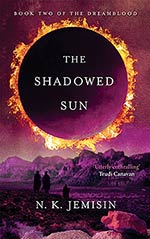
![]() nightxade
nightxade
11/6/2014
![]()
I was hard on the first book in this series, The Killing Moon, mainly because I had read Jemisin's The Hundred Thousand Kingdoms first and fallen in absolute complete and total love with it. The Dreamblood series lacks the depth of characters and relationships that sucked me into The Inheritance Trilogy.
The Killing Moon also troubled me because it spent so much time identifying people by the colour of their skin and insulting the lighter shades. As much as I wanted to read a book that moved far away from the typical pale science fiction and fantasy colour scheme, I did not enjoy constantly reading about how inferior my own skin was.
There is less of the latter in The Shadowed Sun. Instead, the prejudice is against women. There are three major cultures in question. One, the Kisuati, are the people who now rule the city of Gujaareh, after the mad king's attempts at immortality in the previous book. The Kisuati women hold equal power to men and are respected, as evidenced by Sunandi's governing position over Gujaareh. Her influence has helped install the first female Sharer within the Hetawa--but more on that later. While the Kisuati generally treat their women respectfully, whores are still whores, and even the religious Sisters lives are considered forfeit. Even when they are sexually assaulted.
Sexual assault, abuse of women, and rape are constant plot devices in the book, which is ironic since the other two cultures revere women as goddesses. In the "barbarian" Banbarra tribes, women are worth as much as they can show themselves to be worth, but only then are they respected. Rape is frowned upon, and punished, but it is also punishment for women outside the tribe. And in Gujaareh itself, women are revered, but not permitted to do much beyond look good, and their opinions are not particularly valued.
Which makes life difficult for the young Hanani, who is the first female permitted to serve the goddess Hanaja at the Hetawa, the religious centre of Gujaareh. The problems I mention above did deter me to the point of considering not reading beyond the half way point, but I do like Jemisin's writing, and I most certainly love the world she has created, in spite of the racism and sexism. Let's start with the Hetawa and the magic they possess: narcomancy. Unique and well-crafted magic is always a highlight in a good fantasy book, and that certainly is the case here. Through sleep and dreams, the priests of the Hetawa can do many things, from healing, to lie detection, to granting peaceful journeys into the afterlife. They can also kill with deadly efficiency. We learned about the Gatherers previously, and now we learn about the Sharers, who use their powers to heal--but could hurt just as easily, if they make that choice. With such power, corruption is not surprisingly common, as we discovered in The Killing Moon. While the Hetawa's corruption is no longer in question here, we learn about the many other ways those with the dreaming gift can cause harm. In this case, a Wild Dreamer is causing a plague that captures people within tormented nightmares, instantly killing even the most skilled dreamer who attempts to fight it.
Meanwhile, the repercussions of the Kisuati invasion ten years earlier are still echoing through Gujaareh, with rumours of the return of its exiled prince.
The Killing Moon fell a bit short with the political machinations, and all but fizzled out on a promised war, but here, Jemisin goes deeper and gets far more intricate with the details and various parties involved, giving us insight into all of them. I particularly like the intricacies of the different cultures and how they communicate with each other and with the other groups. This is most evident in the exiled prince, Wanahomen, who maintains his Gujaareen ways, but must adhere to the ways of the Banbara whom he will lead to war against the Kisuati to free his people, if he can band the tribes together.
There is a lot more emotional involvement with the characters here, something that was somewhat missing in The Killing Moon due to the subdued nature of the Gatherers. While Hanani shares this demeanour, she is unable to maintain it when she is forced to join the barbarians in the desert. The relationship that develops between Hanani and Wanahomen is bittersweet, and is what managed to get me over my consideration of not reading further. I'm glad I did, because I did like where things ended up, even if I didn't enjoy some of the methods used to get there.
http://bibliosanctum.com/2014/10/14/book-review-the-shadowed-sun-by-n-k-jemisin/